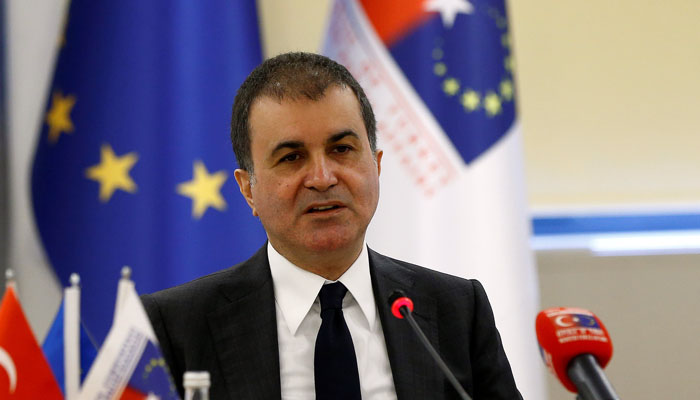Turkey’s EU Minister Ömer Çelik has harshly criticized the approval of a resolution in the European Parliament (EP) that calls for the freezing of accession talks with Turkey, saying that the move is aimed at sabotaging relations between Turkey and the EU.
The resolution calling for the freezing of membership negotiations with Turkey if Ankara implements a constitutional overhaul, backed by a referendum in April, was adopted with a large majority of votes in the EP on Thursday.
Çelik, who criticized the EP decision to approve the resolution as being political, biased and undemocratic, said it is not binding for Turkey.
The minister also asked the EP to respect the will of the Turkish people who approved the constitutional reform package in the referendum on April 16, which introduced an executive presidency in Turkey.
“If they want to cooperate, we are ready to sit and talk. We are open to listening to their criticism, but we are not open to discussing anti-democratic issues such as the invalidation of the people’s will,” said Çelik.
The resolution, proposed by Turkey rapporteur for the European Parliament Kati Piri, “calls on the Commission and the member states, in accordance with the Negotiating Framework, to formally suspend the accession negotiations with Turkey without delay if the constitutional reform package is implemented unchanged.”
The decision was grounded on the incompatibility of the reform package with the principle of separation of powers and the Copenhagen criteria.
A total of 638 out of 751 MEPs attended the vote, with 477 voting in favor of the resolution, while 64 rejected it and 94 abstained.
Çelik also accused the EP of not understanding a failed coup attempt in Turkey last July and criticized it for demanding concrete evidence for the Gülen movement’s involvement in the coup attempt.
“We perceive the attitude that somehow questions whether FETÖ [a derogatory term used by government circles to refer to the Gülen movement] organized the coup attempt as hostile,” added Çelik.
The military coup attempt on July 15 killed over 240 people and wounded more than a thousand others. Immediately after the putsch, the Justice and Development Party (AKP) government along with President Recep Tayyip Erdoğan pinned the blame on the Gülen movement.
Fethullah Gülen, who inspired the movement, strongly denied having any role in the failed coup and called for an international investigation into it, but President Erdoğan — calling the coup attempt “a gift from God” — and the government initiated a widespread purge aimed at cleansing sympathizers of the movement from within state institutions, dehumanizing its popular figures and putting them in custody.
Turkey has suspended or dismissed more than 150,000 judges, teachers, police and civil servants since July 15.
According to a report by the state-run Anadolu news agency on May 28, 154,694 individuals, including journalists, teachers, judges, prosecutors, police and military officers, academics, governors and businessmen have been detained and 50,136 have been jailed due to alleged Gülen links since the failed coup attempt.
